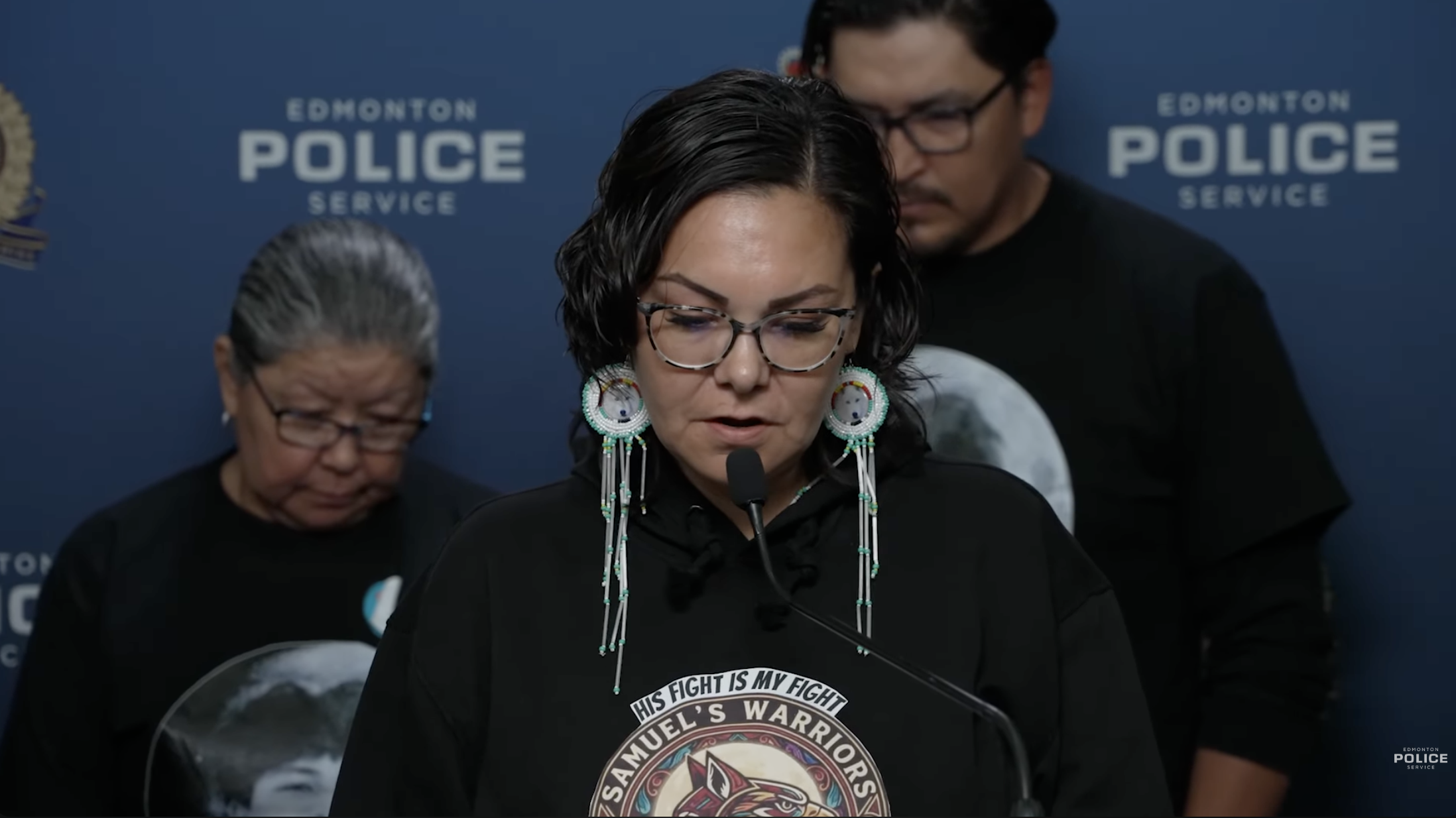syilx students lead Red Dress Day event with powerful calls for change
In ‘Vernon,’ Youth gather to raise awareness for MMIWG2S+: ‘We need a revolution, so we have no choice but to be it’


Content warning: This story includes content about MMIWG2S+. Please read with care for your spirit.
“Canada is all Indian land” were the first words syilx students chose to sing loud and powerfully to open an event for Red Dress Day on their homelands. The song served as a reminder that “Canada’s” stolen land is synonymous with our stolen sqilx’w sisters and kin.
With that, a crowd of more than 60 people — many wearing red or holding signs — took part in a medicine walk to awareness for the missing and murdered Indigenous women, girls and Two-Spirit and gender-diverse people (MMIWG2S+).
The group — led by syilx students from W.L. Seaton Secondary School — travelled from the school to the “Vernon” courthouse, where they led a rally to advocate for justice.
I attended to support my two children and other syilx Youth taking part in the event, which notably had young men who stepped up to lead and show up in a good way for their sisters.
smuqaken, the chairperson of the Okanagan Indian Band Youth Council, said action must be taken to stop this epidemic of violence — which has touched the lives of sqilx’w people since the onset of colonization.
“We all have loved ones who have seen no justice, so as sqilx’w it’s our homeland responsibility to take care of our people — but it’s ‘Canada’s’ job to actually do something,” said smuqaken.
Red Dress Day, also known as the National Day of Awareness for MMIWG2S, takes place each year on May 5.
On May 2 of this year, the House of Commons unanimously passed a motion calling on the government to declare the epidemic of MMIWG2S+ a national emergency. But smuqaken said a revolution is what is really needed.
“As young people, it’s hard to witness what our future holds. We see no change, and we see no justice,” they said.
“We need a revolution, so we have no choice but to be it.”

Also at the walk were aunties, uncles and mental health supports for students from the Okanagan Indian Band. The band’s counsellors said they understand this is still a very real epidemic impacting sqilx’w students, and they showed up to honour them and offer mental health support as the day went on.
It’s time to protect
“When we sing, we do it with our most powerful voices. It acts as a way to clear the path ahead in a good way. It also is to give medicine to the women who come behind us to do the work they need to do. At least that’s what I’ve been taught,” said skookamina Marchand, syilx of nk̓maplqs.
“We are an egalitarian society, and that means we are all necessary and have roles to play to protect one another.”
The students who led the walk, all of whom were syilx, sang the Okanagan Song to honour their homelands and the teachings they were brought up in.

“I came out to support for missing women and children,” said Antoine Gregoire-Swampy, syilx from spaxmn and nk̓maplqs.
He continued to share that when a person is aware of cultural teachings it’s their responsibility to live them.
“It’s important for us to bring our drums, sing the songs for the people, and make sure that we are there to protect those walking with us both spiritually and physically,” he shared in an interview outside of the school.

For Emarie Louis, syilx from nk̓maplqs, learning to drum was part of her journey and empowered her to walk with her people today.
“I never knew how to drum until I came here, it wasn’t until we had our drum group that I learned the songs, and I really love it so much,” she said. “So today I grabbed my drum and drumstick and walked to raise awareness.”
‘We’re young but this is still our reality’
Elizabeth Kooteny, from Nakota Sioux homelands, whose Auntie Misty Potts has been missing since 2015, is what brought her to do the medicine walk.
“My Auntie Eva believed the RCMP weren’t reacting as quickly as they should have. That’s why my family went looking for her themselves all around our reserve,” she said
“This needs to be well known. This needs to be dealt with. What’s happening is serious, and all of Canada needs to know,” said Elizabeth, with profound passion and strength in her voice while the young men sang songs behind her.
smukaqn echoed the call for more awareness.
“We’re young, but this is still our reality. How many times do we need to scream and cry for justice?” they said. “One thing I can say about today is I’m proud to see these young men, my peers stand up and sing, protecting us with their songs and using their strong medicine to honour our people.”

Cruz Louis, syilx of nk̓maplqs says it’s how he and others like him have been raised. By strong women, mothers, aunts and grandmothers, many of whom have endured the violence of colonization but still have the courage to show love.
“It’s how my mother has always raised me, as well as my older sister Jaedyn, to always respect women and to respect everyone,” he shared. “Especially my parents and Elders and to honour the legacy of my granny Rosie Louis who passed before I was born but left her knowledge to my mom and sister and all of her children and grandchildren.”
smukaqen added that the day was for the women, not only MMIWG2S, but all women: those who came before, those who walk with us now, and those who will come after.
“Our prayer is that we don’t need to hand this violence to another generation to deal with and that as young sqilx’w we are going to stand up and uphold our responsibility.”
The students shared the names of the women they walked for and honoured today:
Rosie Louis, Rita (Clegg) Hanuse, Barbara Oppenhiemer, Misty Potts, and Deanna Wertz.
Kinship Protocol: Kelsie Kilawna is empowered by her children smukaqen and skookamina in the writing of this story. It is our standard to transparently identify where kinship connections in our storytelling exist.
Author
Latest Stories
-
‘Bring her home’: How Buffalo Woman was identified as Ashlee Shingoose
The Anishininew mother as been missing since 2022 — now, her family is one step closer to bringing her home as the Province of Manitoba vows to search for her
-
Samuel Bird’s remains found outside ‘Edmonton,’ man charged with murder
Officers say Bryan Farrell, 38, has been charged with second-degree murder and interfering with a body in relation to the teen’s death
-
Book remembers ‘fighting spirit’ of Gino Odjick, hockey’s ‘Algonquin Assassin’
Biography of late Kitigan Zibi Anishinabeg left winger explores Odjick’s legacy as enforcer in the rink — and Youth role model off the ice













